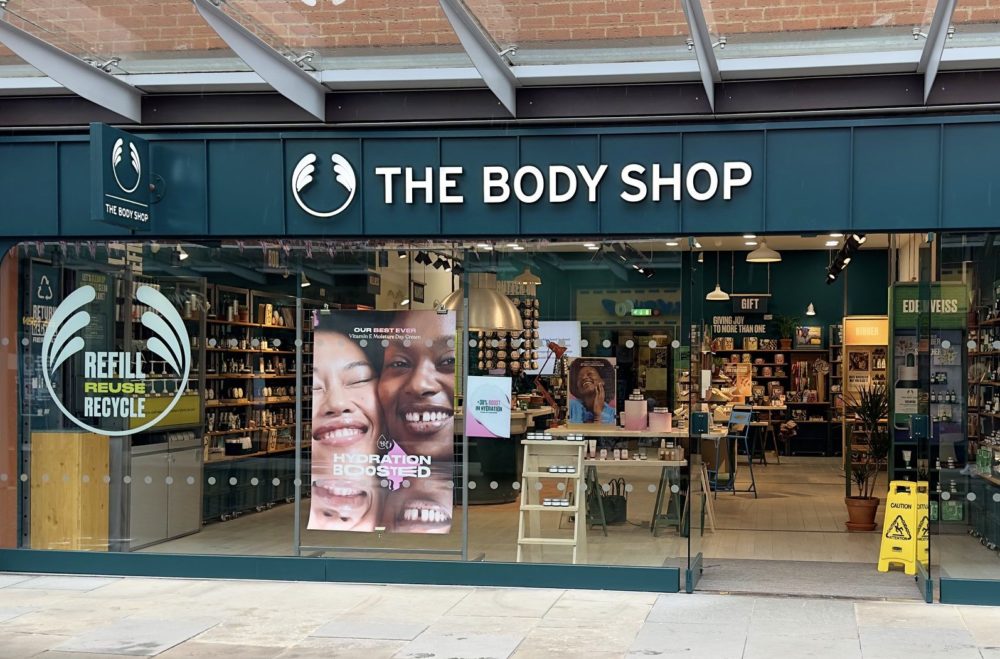The Body Shop goes into administration

Iconic high street cosmetics and skincare retailer The Body Shop went into administration on Tuesday amid weaker customer demand.
The announcement threatens the future of the brand in the UK, its more than 200 shops and thousands of workers, however for the time being the store has made moves to reassure customers that stores are still open.
Posting on its Facebook page yesterday (14 February), a spokesperson said: “Hello, you may have heard in the news that The Body Shop in the UK is under administration.
“We wanted you to know we’re open as usual and all our customers can continue to shop for their favourite products.And…thank you for the huge love we’ve been hearing, it means a lot.”
Administrators said the restructuring is to create “a more nimble and financially stable UK business”.
However, it is a damning blow for the retailer’s workers and passionate customer base.
The Body Shop
The Body Shop is a high street and online retailer, specialising in cosmetics, skincare and beauty products.
Its Welsh presence has diminished over the past few years, with a recent branch closure in Cwmbran, while stores still operate in Carmarthen, Cardiff, Swansea and Bridgend.
There have been, however, many more sellers across Wales who acted as consultants for the brand via The Body Shop at Home but this came to an end this month.
The business had 215 UK stores at the end of last year, and also has global franchises which will not be impacted by the insolvency process.
It was founded in 1976 in Brighton by Anita Roddick and her husband Gordon as one of the first companies to promote so-called ethical consumerism, only selling its own ethically-produced items.
Owners
Anita Roddick grew the business rapidly over 30 years in charge, with the business witnessing particular success on UK high streets in the 80s and 90s.
“In the 1980s, the Body Shop was the place to go for young shoppers to splash out on fresh scented bubbles and beauty ranges, with a deep environmental conscience and a focus on social justice and conserving nature,” said Susannah Streeter, head of money and markets at Hargreaves Lansdown.
As a result, the group floated on the London Stock Exchange for £80 million in 1984.
The business continued to grow for two more decades but Ms Roddick and Gordon, who she ran the business alongside, came under criticism after they ultimately sold the business to French industry behemoth L’Oreal for £652 million in 2006.
A year later, Ms Roddick died aged 64 after a brain haemorrhage.
Under the ownership of L’Oreal, the firm saw its business model shift slightly, with production moving to the Philippines and discounts used to drive sales.
At this time, many of its core customers shifted from the brand over concerns about the owners’ ethical stance – particularly with regard to animal testing.
After increased international expansion, the business was then bought by Natura & Co, the Brazilian owners of Avon who specialised in direct-to-consumer sales, for £880 million.
Six years later the company shifted ownership again, being sold for a cut-price £207 million to German-headquartered private equity firm Aurelius.
In a recent move, the store made moves to go fully vegan to try to draw back much of its consumer base, but many had already left to emerging brands, or have been disillusioned by the changing product bases.
Struggles
Administrators FRP said the business “faced an extended period of financial challenges under past owners, coinciding with a difficult trading environment for the wider retail sector”.
It witnessed weaker consumer spending but this came despite growth in other parts of the sector.
GlobalData analyst Tash van Boxel said the company was “ahead of its time” with its initial brand identity but struggled to keep up with new competitors with increased points of difference in more recent years.
“While The Body Shop continues to stand by its ethical and cruelty-free brand values, these claims have become industry standards, weakening The Body Shop’s point of difference.
“Indeed, not only are brands now offering products with similar claims, but they also bring more to the table to attract shoppers.”
High street rival Lush recorded strong growth in recent years on the back of strong ethical credentials and vibrant products.
It has also seen growth cut into by the rapid expansion of online-focused rivals such as The Ordinary and Sephora.
Administration
FRP Advisory, who were hired on Tuesday, will assess offers for different parts of the company in order to find the best options to save jobs and shops, but will particularly focus on ensuring as much money is recouped as possible to return to creditors.
This could see the group sold whole as a going concern, broken up into parts for sale, or only selling specific assets such as its brand or remaining stock depending on demand from possible suitors.
Jeremy Whiteson, restructuring and insolvency partner at Fladgate, said: “It is hoped that a solution can be found which safeguards the jobs of staff.
“However, it seems likely that many buyers will simply be interested in the brand and stock, shifting the business to an online operation or to be integrated into a multi-brand retailer.”
Support our Nation today
For the price of a cup of coffee a month you can help us create an independent, not-for-profit, national news service for the people of Wales, by the people of Wales.






To be replaced by ‘The Body Mutilation Shop’…